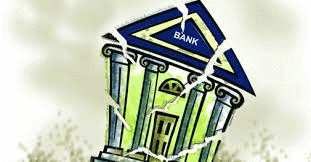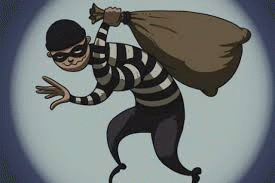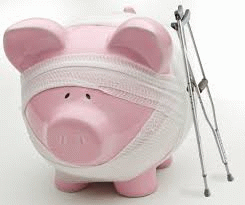If I owe you a pound, I have a problem; but
if I owe you a million, the problem is yours."
-John Maynard Keynes
The daring bank robberies of Bonnie and Clyde during 1931 to 1934 captured the American public imagination and glamorized the image about outlaws. The legend of the duo was immortalized in a 1967 Hollywood film by Arthur Penn starring Faye Dunaway and Warren Beatty . The daring exploits of the cigar smoking and machine gun toting Bonnie and her partner in crime Clyde ended in gory violence when the pair was gunned to death in an ambush by law enforcement officers.
But the bank heists of Bonnie and Clyde are measly pickings when compared to bank heists executed by corporate elites in India. The scale of bank heists beggars the imagination as the Indian corporations owe the public sector banks huge sums of money running into billions of Rupees. One estimate of the loans gone bad places the figure at Rs 2.06 trillion. Bank analysts warn only half would be recovered by the banks. [i] If Bonnie and Clyde were to be alive today their jaws would have dropped at the sheer magnitude of the corporate loot of public sector banks.
Addressing the media, the general secretary of the Bank Employees' Federation of India Pradip Biswas pointed out that' the big corporate houses, having appropriate political patronage are the major culprits. Bank employees' movement and other Left and democratic forces have long been demanding publication of the list of defaulting corporate borrowers responsible for growing Non Performing assets (NPA); successive governments have stonewalled the demand'. [ii]
Striking a somber note on the health of the banking credit system Raghuram Rajan-the governor of the Reserve Bank of India- accused the large corporate borrowers of being freeloaders of riskless capitalism. He castigated the big corporate houses for making the bank credit system unstable and unhealthy. Deploring the practice of lionizing these corporate honchos as captains of Industry, he said these were really parasites that leeched on the blood of the hard working people of India. [iii]
One of the flamboyant examples of the freeloaders of riskless capitalism is the liquor baron Vijay Mallaya. His fondness for luxurious mansions, race horses and expensive cars earned him the sobriquet 'the king of good times' but for the consortium of mostly public sector banks from whom he borrowed close to one billion dollars for his ill fated Kingfisher Airlines which ran to the ground, it was a different story. He became a king of bad times as he left a pile of bad debts for the banks to swallow. Recent media reports suggest that the banks after months of inaction have taken measures to declare him a willful defaulter. In Reserve Bank of India parlance, a willful defaulter is a borrower that is able but unwilling to pay, has diverted loan proceeds for other than their initially stated use or has overstated profits to obtain a loan. In simple language, he scammed the public sector banks. [iv]
But to be fair to the king of good times, he is not alone in freeloading on public sector banks. There is a merry band of big corporate borrowers who do the same and contribute to the bulk of unpaid debts to the banks.
The alarm bells of the ticking debt bomb was sounded by a report published by Credit Suisse in the year 2012 and another report from the Reserve Bank of India Deputy Governor K.C. Chakrabarty highlighted the fact of debt overload among leading corporate groups. At the top of the chart of corporate borrowers are Adani, Essar, GMR, GVK, Jaypee, JSW, Lanco, Reliance ADA, Vedanta and Videocon. A significant bulk of these corporate borrowers are in Infrastructure /Power projects and have been 'on a borrowing spree with their liabilities rising six-fold over the six years ending March 2013 to touch Rs. 6.31 trillion.'[v] Moreover, as the Credit Suisse in its report appropriately titled the House of Debt points out the aggregate debt of these 10 corporate groups constitute 13% of the bank loans and 98% of the banking system's net worth. [vi]
More worrisome is the fact that these corporate borrowers which are heavily indebted to public sector banks have poor financials such as poor profitability outlook which jeopardizes their ability to pay interest to the banks. The plunging rupee would also have a crippling effect on these corporations 'as many have loans that are 40% to 70% denominated in a foreign currency. Adani Enterprises, Jaiprakash Associates Ltd. (the group that that built India's first Formula One track) and Reliance Communications, are amongst the worst hit as they have the largest percentage of borrowings through forex loans.'[vii] This means that the unpaid debts will snowball into restructured debts and the strain on the banks would be unendurable.
The recent controversy about $1 billion loan to Adani Group by State Bank of India has raised questions about the bona fides of the Modi BJP government to crack down on corporate freeloaders of public money. Gautam Adani -a personal friend of Modi and his financial backer in the recent elections- is in the eye of a perfect storm on account of the loan sanctioned by the leading public bank(SBI) to Adani's coal venture in Australia. Critics of the loan point out that the Adani group has already exposed the public banks to debt overload and that a further sanction of a billion dollars to a risky coal venture would only make matters worse. [viii] The backlash of public opinion has made the State bank of India to keep the loan sanction on hold for the time being.
The public sector banks saddled with bad debts have to be recapitalized to the extent of around USD 40 billion to regain balance sheet strength. And this is a tall ask. This could be achieved by nationalising the bad assets of the Indian banks and heap the burden on the taxpayer or by selling the government holding in these banks to less than 50% and passing control to the corporate class that caused the crisis in the first place. [ix]
The underpinning of the corporate debt crisis is the crony capitalist policies (make the rich richer and the poor poorer) initiated by the Manmohan Singh's Congress government and pursued with vigour by the present BJP government under Modi. As corporate freeloaders are the main financiers of elections, they are a power unto themselves and call the shots in the political arena. There is very little that the BJP government can do except shift the burden on the public.
For the urban middle class who in large numbers voted for a messiah in Modi, there is a heavy price to be paid. This could come in additional indirect taxes, more expensive power tariffs and cooking gas costs. To an already burdened untermensch who come to cities from rural homes the cutting of social spending such as poverty alleviation and food security schemes would be an intolerable burden for them to bear.
The chickens have finally come to roost in Modi Land.
C R Sridhar
(Note: You can view every article as one long page if you sign up as an Advocate Member, or higher).







